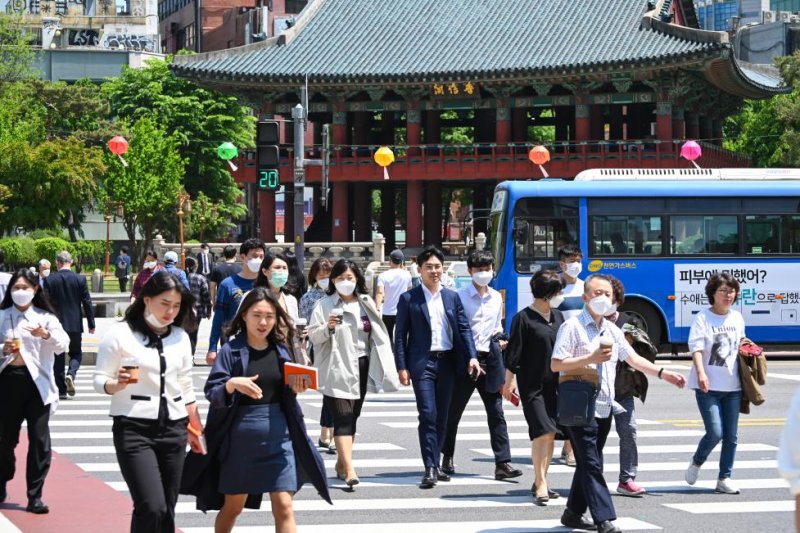1 of 5 | South Korea began a new phase of loosened social distancing guidelines on Wednesday as the country reported no new local COVID-19 infections for the third day in a row. Photo by Thomas Maresca/UPI
SEOUL, May 6 (UPI) -- Wednesday marked the beginning of a new phase of loosened social distancing guidelines in South Korea and streets were crowded in downtown Seoul as daily life returned to something close to normal.
The country, which marked its third day in a row of no new locally transmitted COVID-19 infections, commenced its "everyday life quarantine" phase, meant to allow for the continued opening up of social and economic activity while maintaining basic health and hygiene protocols, such as wearing masks and practicing safe distancing.
As temperatures approached 80 degrees under a sunny sky, office workers in downtown Seoul filled restaurants and cafes during lunchtime and strolled or sat outdoors alongside a stream that runs through the center of the city.
Most said they felt safe under the relaxed regulations.
"The atmosphere is looser now," said 27-year-old Jang Ji-eun, an IT worker who was sitting by the stream on her lunch break. "I still have my mask and am being cautious but my daily routine seems pretty much back to usual."
Jang said she was aware of the contrast between South Korea and other countries that have seen far more severe outbreaks and extreme lockdown measures and appreciated the steps her government has taken to contain the coronavirus.
"I feel proud of South Korea," she said. "At first people were worried because we had an early outbreak. But now South Korea seems like one of the least dangerous places and is seen as a leading country in treating COVID-19."
South Korea was the first country after China to see widespread local transmission of the coronavirus after a February outbreak centered around the southeastern city of Daegu. But officials managed to dramatically flatten the curve of new infections through early and aggressive testing and tracing.
Health officials announced just two new COVID-19 cases on Wednesday, both brought by arrivals from overseas. The country's total number of cases rose to 10,806, while the death toll rose by one to 255.
As new cases have continued to steadily drop, South Korea has allowed for the reopening of venues, such as recreational facilities, nightclubs, places of worship and museums.
On Tuesday, professional baseball returned to stadiums without fans as the Korean Baseball Organization kicked off its 2020 season. Schools will also start reopening next week, with high school seniors returning to class on May 13 and other grades resuming in a phased process throughout the rest of the month.
Health officials stressed that the new measures were not a full return to normal life.
"We are transitioning into social distancing for daily life, which is all about striking a balance between our ordinary daily lives and the quarantine measures," Jung Eun-kyeong, director of the Korea Centers for Disease Control and Prevention, said at a press briefing Wednesday. "However, it's not going back to the pre-COVID-19 days and if the situation is aggravated we will return back to intensified distancing measures at any time."
Jung said that officials would be closely watching for any outbreaks tied to a long holiday weekend, which just ended and saw heavy domestic travel. More than 200,000 visitors descended on the popular tourist destination of Jeju Island over the holidays, a higher-than-expected total, and department stores around the country were packed with eager shoppers.
The KCDC director said the country is aiming to maintain control over the spread of COVID-19 but warned that another outbreak could easily occur.
"This does not mean that we can be letting our guards down yet," she said. "COVID-19 can spread silently among people with no symptoms and it also can lead very quickly to widespread cluster infections."
Jung added that people were being called on to take personal responsibility under the new guidelines in order to avoid scenarios seen in many other countries.
"In Europe and the United States, they are going through very intensive lockdowns and immense economic fallout," she said. "In order to prevent this from happening here in Korea we will have to be responsible for our own quarantine measures."
In the meantime, South Koreans continued to enjoy a sense of freedom that is rare in many places.
"I feel the situation is quite under control," said Kim Ji-Hoon, a 40-year-old office worker who was strolling during his lunch break. "It's not 100 percent back to normal. Maybe 80 percent, but that makes me very proud."















